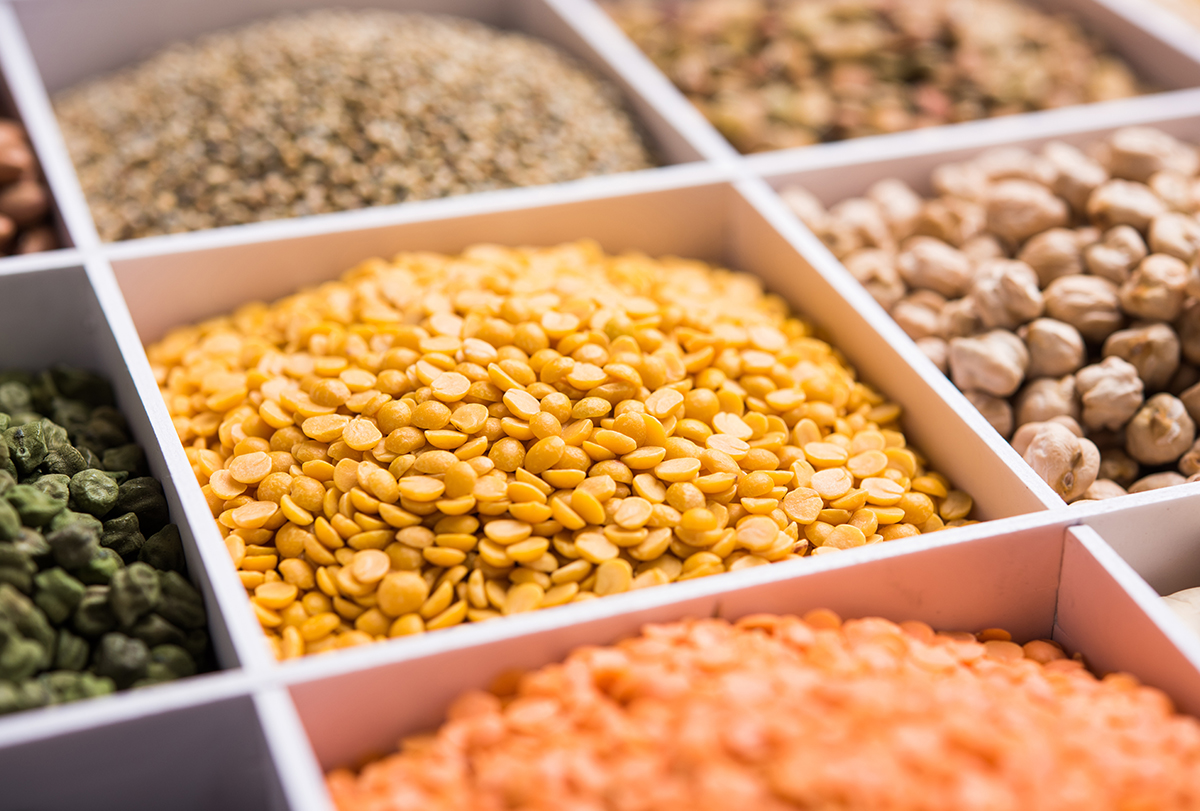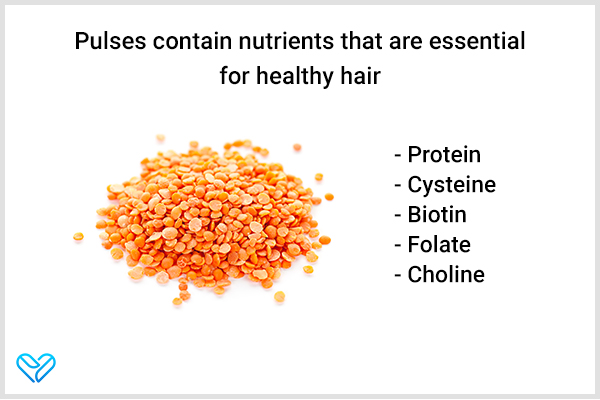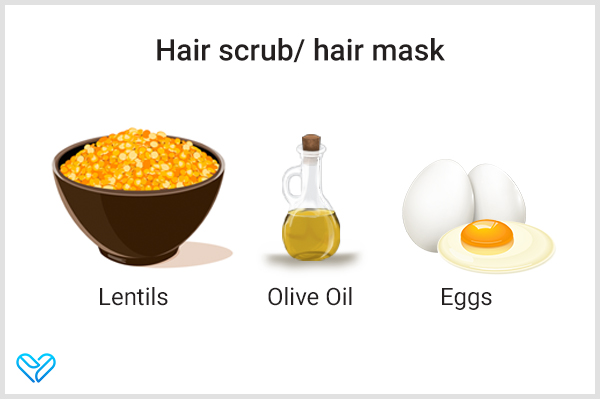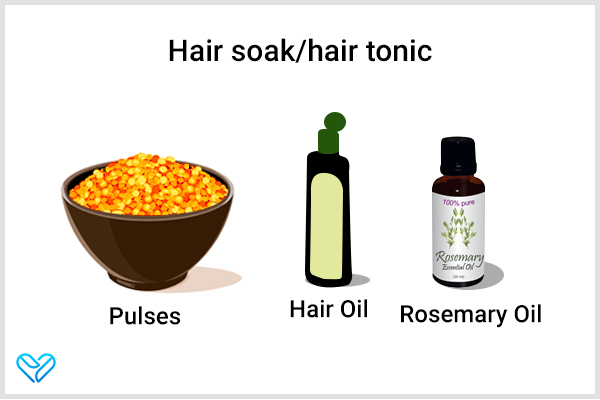In this article:
Pulses are called the “poor man’s meat.” Their economic feasibility and good-quality protein content make them essential components of a vegetarian diet.

In the Indian subcontinent specifically, pulses such as lentils, kidney beans, mung beans, black gram, chickpea, cowpea, and peas are widely consumed. (1)
Due to their protein content, pulses are also especially beneficial for the hair.
Pulses contain 21%–25% protein and essential amino acids including methionine, tryptophan, and cysteine. They also contain B complex vitamins, magnesium, and zinc. Thus, pulses can be a wonder food for hair health. (2)
The hair is our crowning glory. Even little changes in the growth and quality of your hair can lead to significant changes in how you perceive yourself.
The American Academy of Dermatology suggests various reasons you may experience hair loss, and these include genetics, medication, hormonal imbalances, environmental factors, and a nutritional deficiency such as deficiencies in biotin, protein, and zinc. (3)
If you’re suffering from nutritional deficiencies and lacking important proteins and nutrients in your diet, pulses can help to provide nutrition for hair growth and the maintenance of hair strength, volume, and shine.
How Can Pulses Benefit the Hair?
While most reasons for hair loss will need to be specifically addressed, the consumption of pulses can help provide the nutrients essential for healthy hair.

Protein
Protein is the building block of hair. If you are not consuming enough protein in your diet, new hair will not grow back to replace the ones that fall out. (4)
Along with the amino acid cysteine, proteins make keratin, the special protein in hair and nails. Since keratin cannot be consumed, you have to consume nutrients (such as protein and cysteine) that will synthesize keratin and reverse hair fall to an extent. (4)
Cysteine
Cysteine is an amino acid that is essential for increasing the growth of hair. It increases the activity of keratin to build the hair from the root. (4)
Recently, many new hair formulations combine cysteine in the form of supplements, and studies have found it to boost keratin production and reduce oxidative damage that may destroy hair cells. (5)
One of the best foods rich in cysteine is pulses! Thus, consume chickpeas, cowpeas, and lentils for your daily cysteine boost. (1)
Biotin
Biotin is another beneficial vitamin useful for hair growth and health. Although pulses are not rich sources of biotin, they do contain some amounts of it that can help reverse hair fall to some degree. (6)(7)
Folate
Hair loss has been linked to a deficiency in folate (vitamin B9). It is involved in the formation of new DNA when cells divide and is useful in reversing hair loss. (8)
Folate is generally supplied from the diet and pulses are one of the highest vegetarian sources of folate. (2)
Choline
Choline is a nutrient that isn’t classified as a vitamin or mineral but is considered essential for human health. For hair in particular, choline has been identified as a potent tool in reversing hair thinning and promoting growth. (9)
Though eggs are the richest sources of choline, some pulses do offer substantial amounts (10) and can be used to promote hair growth. For instance, 100 g of cooked chickpeas contain 43 g of choline. (11)
How to Use Pulses to Improve Hair Health
You can use pulses in the following ways to boost hair health.
1. Consuming pulses as part of the diet
One of the best ways to obtain the nutrients and benefits of pulses is by including them as part of the daily diet. One serving each day of lentils, chickpeas, cowpeas, or peas can be used to make side dishes, salads, wraps, or soups.
2. Using pulses as hair scrubs or masks

Red lentils, in particular, make a great hair mask. Here’s how you can make it:
- Soak ½ cup of lentils overnight.
- The next day, make a paste by blending the soaked lentils. If you want to use them as a scrub, leave them coarse, and if you want to make a mask, blend them into a fine paste.
- Add 2–3 tablespoons of oil such as olive oil or coconut oil.
- Optionally, you can add room-temperature yogurt or an egg.
- Apply the mixture from the hair roots to the tips, and leave it on for 30 minutes.
- Wash it off with warm water, and follow up with a shampoo and conditioner.
3. Using pulses as hair soaks or tonics

You can avoid the mess that comes with applying hair scrubs and masks by using hair soaks and tonics instead. Here’s how you can make them:
- Soak your pulse of choice overnight.
- Boil the pulse in the same water while also adding more water.
- Drain and reserve the water.
- Add 2 tablespoons of hair oil and a few drops of rosemary oil.
- Pour the mixture over your hair, or you can use a spray bottle to spray it into the roots of your hair.
- Leave it on for 30 minutes.
- Wash your hair as usual.
Rosemary oil is also gaining popularity as a hair growth agent and can promote new hair to replace the ones lost. (12)
What Shampoo Is Best for Reducing Hair Fall?
If your hair fall is a result of genetics or nutritional deficiencies, shampoos won’t affect hair loss. Consult a dermatologist to identify the ideal shampoo for your hair concern.
It is recommended you choose shampoos that have a low pH and are sulfate-free. In addition, zinc pyrithione is also a useful shampoo ingredient that can reduce hair fall. (13)
Practical Takeaways
- Pulses are essential vegetarian sources of protein.
- They contain varying contents of nutrients essential for hair growth such as folate, biotin, cysteine, and choline.
- Pulses can be consumed as part of the diet or used as hair masks or hair tonics.
- Was this article helpful?
- YES, THANKS!NOT REALLY


